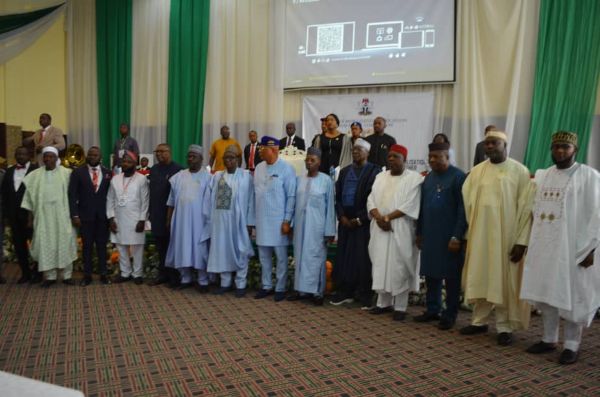
Nigeria’s fragile fiscal federalism is once again under scrutiny as the Revenue Mobilisation Allocation and Fiscal Commission (RMAFC) calls for a systematic, constitutionally backed review of the country’s revenue allocation formula every five years.
The bold proposal emerged from a communiqué issued at the close of a three-day retreat for newly inaugurated RMAFC commissioners and management staff, held in Uyo, Akwa Ibom State. The communique, jointly signed by RMAFC Chairman, Dr. Mohammed Shehu, and Secretary, Mr. Joseph Nwaze, underscores a growing national concern: a 16-year-old revenue-sharing formula that no longer reflects the realities of modern governance or the financial stress facing subnational entities.
“The current revenue allocation formula is long overdue for review,” the Commission declared. “We propose a constitutional amendment to make such reviews mandatory every five years.”
THE BACKDROP: A STRUCTURE STRAINED BY TIME AND TURBULENCE
Nigeria’s existing revenue allocation formula—where the Federal Government receives 52.68%, states 26.72%, and local governments 20.60% of federally collected revenue—has remained unchanged since 2008, despite drastic socio-economic transformations, a changing demography, and increasing pressure on states and local councils.
The call for a five-year review is not merely administrative; it is a political and economic necessity, as multiple stakeholders across the federation continue to demand a more equitable and performance-linked distribution of revenue.
A PUSH FOR LOCAL GOVERNMENT FINANCIAL AUTONOMY
In a landmark alignment with the Supreme Court’s July 2024 judgment granting financial autonomy to local governments, the RMAFC is now advocating for a constitutional amendment that would enable local councils to receive their allocations directly from the Federation Account—bypassing the often politically manipulated state joint allocation committees.
“To deepen democracy and improve grassroots development, we must ensure that local governments are not at the mercy of state governors,” the communique stated.
Additionally, RMAFC is championing an amendment to the 1999 Constitution to officially include local government chairmen and councillors as beneficiaries of the national remuneration framework—a move that would embed financial legitimacy into their offices and arguably enhance accountability.
REAL-TIME OVERSIGHT: THE NATIONAL REVENUE DASHBOARD INITIATIVE
Beyond constitutional reforms, the Commission revealed plans to establish a National Revenue Dashboard—a digitised, real-time monitoring system to interface with revenue-generating agencies such as the Federal Inland Revenue Service (FIRS), Nigerian Customs Service (NCS), and Nigerian National Petroleum Company Limited (NNPC Ltd).
This proposed digital framework would enhance transparency, accuracy, and efficiency in monitoring revenue inflows and enforcing compliance with remittance obligations. Such a move echoes global best practices where technology is deployed to demystify public finance and reduce leakages.
BRANDECONOMY INSIGHT: WHY THIS MATTERS
The RMAFC’s retreat signals an emerging front in Nigeria’s ongoing battle to restructure its governance and fiscal architecture. While the 2014 National Conference and ongoing constitutional amendment conversations have called attention to the imbalance in revenue allocation, concrete action has been elusive.
What is at stake here is not just resource distribution—but national cohesion, political trust, and functional federalism. States and LGAs continue to bear the burden of service delivery—education, healthcare, infrastructure—yet remain starved of financial independence or fiscal predictability.
Experts believe that institutionalising periodic reviews of the revenue formula, alongside full financial autonomy for LGs, could unlock dormant developmental potential at the grassroots and reduce tensions at the national centre.
However, achieving this vision will require political will from the Presidency, cooperation from state governors (many of whom oppose direct LG funding), and National Assembly amendments to Section 162(2) of the Constitution.
RETREAT THEME: RMAFC’S ROLE IN NATION BUILDING
Held under the theme “Understanding the Role of RMAFC and Other Stakeholders/Agencies in Nation Building,” the Uyo retreat was both symbolic and strategic—serving to re-orient new members of the Commission and reassert RMAFC’s constitutional relevance in a rapidly evolving fiscal environment.
CONCLUSION: A COMMISSION STEPPING INTO ITS MANDATE
For decades, the RMAFC has been seen as a bureaucratic bystander in Nigeria’s fiscal story. But its latest moves—constitutional advocacy, digital transformation, and grassroots empowerment—suggest it is preparing to play a more assertive role in shaping a new revenue narrative for the country.
If the Commission can build consensus and institutionalize these reforms, it may finally fulfil its constitutional promise: to ensure fairness, accountability, and fiscal justice in how Nigeria shares its wealth.












